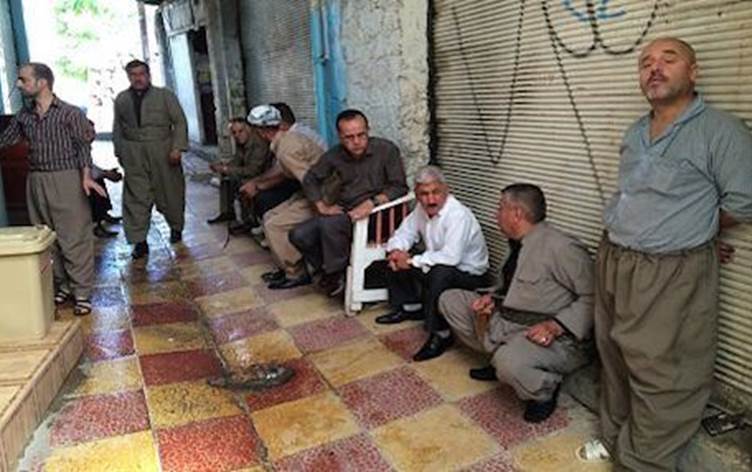ERBIL, Kurdistan Region – Tea houses in the Kurdistan Region were abuzz with gossip and opinions about what is happening to Iraq, after the Islamic State of Iraq and Syria (ISIS) and other militant forces toppled Mosul and Tikrit and currently surround Samarra, 70 km north of the Iraqi capital.
It is anyone’s guess what will come next. But as Baghdad residents prepare for the worst, storing stocks of water and food supplies, their northern compatriots in Kurdistan were relaxed, even hopeful about the future as they talk excitedly over tea.
Latif Mawlud, a shopkeeper, thought that the Kurdish Peshmerga military should stay out of the fray. “I don’t think it’s a good idea for Kurds to intervene in the conflict, because it’s not a Kurdish-ISIS issue: It’s between Arabs.”
Ali Jamil, a farmer pouring a massive dose of sugar into his teacup as he weighed into the discussion, said the biggest worry was more refugees arriving in Kurdistan.
“I don’t think ISIS will start attacks on Kurdistan, but it definitely socially and economically affects the region,” he said. “We, in the KRG, have to take care of thousands of refugees inside our borders, and there are many Kurds who live in Mosul.”
The events have stirred Kurdish nationalist sentiment, which is never really far from the surface. A statement from the Peshmerga spokesman today confirmed that virtually all Kurdish areas outside KRG administration are now under Peshmerga control. This includes the city of Kirkuk, which has long been envisioned as the capital of a future independent Kurdish state. Oil-rich Kirkuk has been at the heart of a territorial dispute between the KRG and the central government, both of which claim the multi-ethnic city as their own.
“The Peshmerga shouldn’t have missed the opportunity to take control over Kirkuk in 2003, when they cooperated with US armies to free Iraq,” said Dlawer Omer, a civil servant. “This is another golden ticket for Kurds not to give up or surrender Kirkuk one more time.”
He added that this was the time to enact Article 140 of the 2005 Iraqi Constitution. This entails carrying out a census and referendum to determine the status of Kirkuk and the disputed areas --something that was supposed to have happened by the end of 2007.
“Controlling Kirkuk puts Maliki under huge pressure to implement Article 140. ISIS’s big push magnified the power of the Peshmerga, and we hope these facts achieve a further step towards the constitutional rights of Kurds,” Omer opined.
Others questioned whether such measures will ever take place, believing the Peshmerga will simply hold on to the regions as the KRG declares independence, citing irreconcilable differences with the crumbling central government.
If the current oil and budget disputed with Baghdad push the region towards declaring independence or confederation, the region would not be able to satisfy its population unless the new state included Kirkuk. What once seemed an insurmountable hurdle has been swiftly resolved -- to the shock and delight of many.
Abdullah Hassan, a retired 75-year-old, told Rudaw: “I believe the fight between Iraqi security forces and ISIS is totally in the interest of Kurds, and shouldn't involve any hardship or fight for Kurds.” Reflecting a common reluctance to get involved in the fight beyond Kurdish territory, he acknowledged that they may turn their energies towards Kurdistan.
“ISIS is supported by Iraqi former Baathists and many other extremist groups. ISIS can hurt Iraq and Kurdistan region as well, but they will fail at the end.”
Nahro Muhammed, a lecturer at Salahaddin University, agreed with Hassan.
“I’m not for a single second with Kurdish intervention to cooperate with Iraqi armies to face ISIS outside disputed areas, as we see no advantage behind this. We don't have to fight for an army that has put Kurdistan under pressure,” he said, referring to recent military stand-offs in the disputed areas. Few forget that the central government has also pressured the region economically, cutting the KRG budget and refusing to pay salaries of employees working in Kurdistan region.
Massoud Nuri, a young lawyer, doubted that negotiations between Erbil and Baghdad would follow the usual pattern in future. “The constitutional disagreements have been an obstacle for Kurds to gain their rights. But now there’s no longer a word called constitution in this destroyed country. Kurdistan can quite reasonably take power over Kirkuk and all other disputed areas, because Iraq has lost its grip on control.”



Comments
Rudaw moderates all comments submitted on our website. We welcome comments which are relevant to the article and encourage further discussion about the issues that matter to you. We also welcome constructive criticism about Rudaw.
To be approved for publication, however, your comments must meet our community guidelines.
We will not tolerate the following: profanity, threats, personal attacks, vulgarity, abuse (such as sexism, racism, homophobia or xenophobia), or commercial or personal promotion.
Comments that do not meet our guidelines will be rejected. Comments are not edited – they are either approved or rejected.
Post a comment